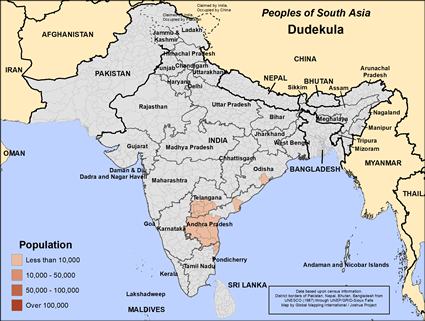Dudekula in India

Photo Source:
Anonymous
|

Map Source:
People Group data: Omid. Map geography: UNESCO / GMI. Map Design: Joshua Project
|
| People Name: | Dudekula |
| Country: | India |
| 10/40 Window: | Yes |
| Population: | 10,000 |
| World Population: | 10,000 |
| Primary Language: | Telugu |
| Primary Religion: | Islam |
| Christian Adherents: | 0.00 % |
| Evangelicals: | 0.00 % |
| Scripture: | Complete Bible |
| Ministry Resources: | Yes |
| Jesus Film: | Yes |
| Audio Recordings: | Yes |
| People Cluster: | South Asia Muslim - other |
| Affinity Bloc: | South Asian Peoples |
| Progress Level: |
|
Introduction / History
Dudekula are a small community in South India. They are known by other names such as "Pinjari", "Bhai", "Panjakuttai", and "Panjari". In Telugu, the state language of Andhra Pradesh, "dude" means cotton and "ekuta" means cleaning. Hence, they are locally called the Dudekula, the cotton cleaners and mattress makers. Telugu is their mother tongue and it is used for communication at home and with outsiders. They also use the Telugu script. The personal name giving pattern of the Muslim Dudekulas is similar to their Hindu neighbors.
What Are Their Lives Like?
The Dudekula marry within their group but not within their particular clan. Persons belonging to a clan are considered as brothers and sisters and there are no marriage alliances between these. For example, Dudekula with the Ratollu surname cannot marry among themselves. Hence for marriage alliance they go to someone with a different surname like Amburollu. They marry cross cousins:father's sister's daughters and mother's brother's daughters. As a result they are looked down upon by other Muslims. To overcome this, they are now adopting the customs and manners of more Islamized groups. Marriages are settled and observed with Islamic traditions. Both Dudekula men and women have accepted modern education and have occupied jobs in different fields. All these have helped the Dudekula elevate their status in Indian Muslim society.
What Are Their Beliefs?
The Dudekulas practice a folk version of Islam. As a rule, they do not have family, clan or village deities like Hindus; they pray only to Allah. Yet they are affiliated with specific Muslim saints. Their weekly Islamic congregations meet on Fridays. The sermon is conducted in Urdu and later it is translated into the local language of Telugu, since the Dudekula seldom understand Urdu. They regularly visit Muslim shrines on pilgrimages. They have a patron saint, and they attend his annual "funeral ceremony." They also go on pilgrimage to take vows or pay their offerings. When they are there, they offer a ritual of reciting the first page of the Quran in the name of their saint and also offer food to the poor. Dudekula were originally Hindu who converted to Islam a few generations ago. Until a few years ago they vacillated between the two religious traditions. Of late they have adopted entirely Islamic rituals, traditions, customs, and manners. Because of their poverty and also the un-Islamic customs they practiced they had a low status. They are now gaining higher status by adopting more orthodox Islamic customs. The urge to claim higher status has motivated the younger generation to learn Urdu and classical Arabic. Their women have begun observing Islamic-based seclusion rules, dress code and have dropped the Hindu custom of wearing "kumkum" on their forehead. Though quite a few of their rituals have Hindu roots, they are now renaming them with Urdu terms but still observing them.
What Are Their Needs?
The Dudekula people need to put all their trust in Jesus Christ so they can experience life to the full. The Dudekula need to understand that Jesus or Isa is much more than a human prophet.
Prayer Points
Pray for a spiritual hunger that will give the Dudekula people a willingness to investigate the claims of Jesus Christ. Pray for a disciple making movement that will bless the Dudekula people this decade. Pray for the Lord to send out workers to the Dudekula people and tell them about Isa.